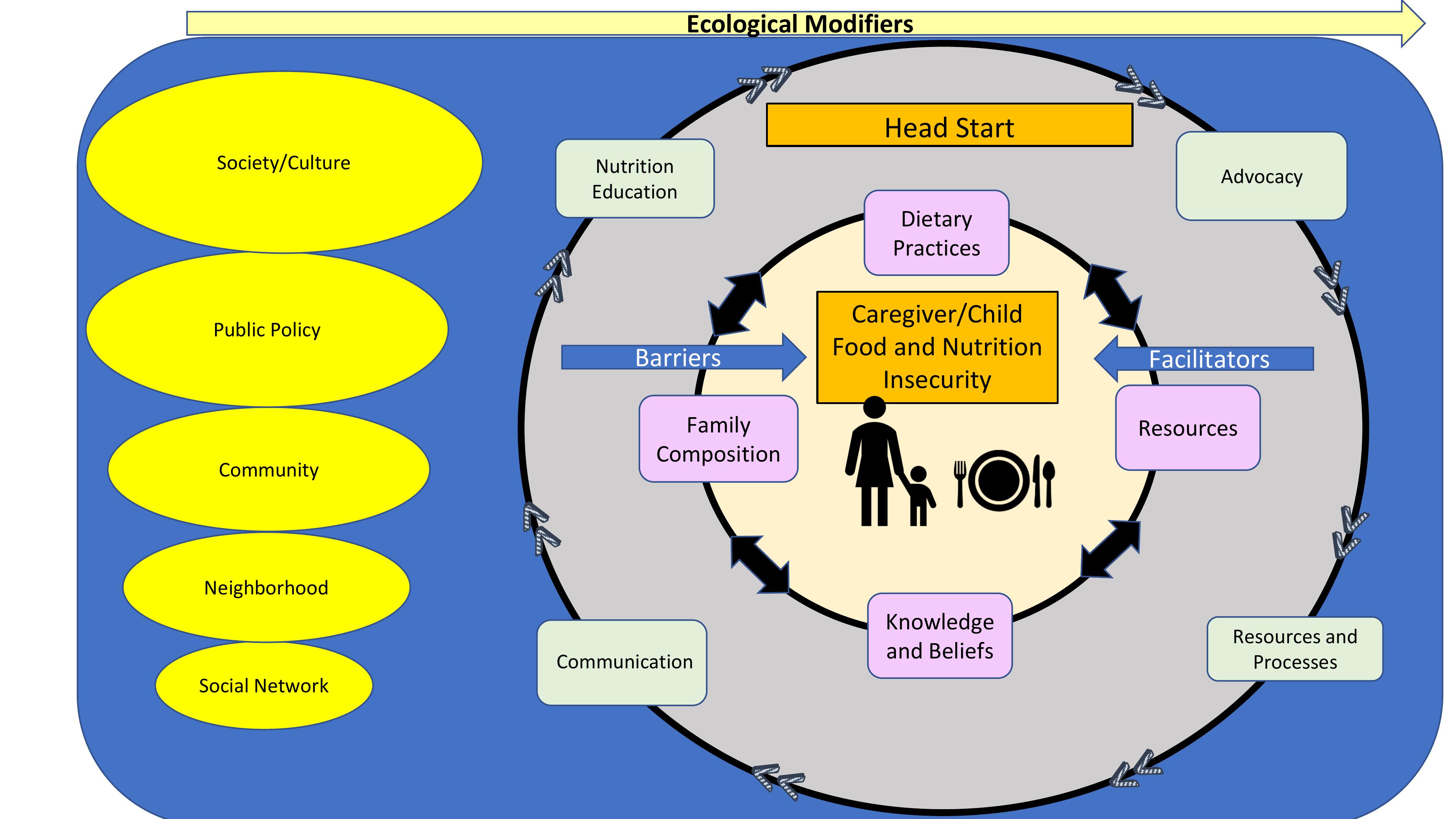Back
Background: A protective factor against food insecurity is child participation in Head Start (HS). Food insecure children have poor diet quality and therefore, may also be nutrition insecure. Children in HS have higher risk of food and nutrition insecurity (FNI) than those in the general population. Details on experiences of HS families related to FNI, as well as HS employees who interface directly with them are limited.
Objective: The objective of the study was to elicit HS families and employees' perspectives on family experiences with FNI and identify how HS addresses them.
Design/Methods: This was a qualitative study through focus group discussion. Four virtual focus groups took place from August 2021 to January 2022 with 27 HS families and Family Advocates. Focus groups were moderated by a facilitator using a semi-structured interview guide. Qualitative analysis used an iterative inductive/deductive approach.
Results: A conceptual framework emerged with themes describing the relationship of HS families with HS and their food environment along with social ecological modifiers affecting FNI. HS impacts family food and nutrition status through the following themes: 1) resources and processes; 2) advocacy; 3) communication; and 4) nutrition education.
Conclusion(s):
HS utilizes a two-generational approach focused on education and skills for children and parents to improve FNI for families. Through multi-component interventions via Family Advocates, there is disruption of generational cycles of food behaviors which contribute to FNI. Other programs that reach underserved children can use a similar model to inform future interventions and offset the effects of FNI.

Public Health & Prevention
Public Health & Prevention 3
336 - Head Start and Impact on Family Food and Nutrition Insecurity: Perspectives from Focus Groups
Monday, May 1, 2023
9:30 AM – 11:30 AM ET
Poster Number: 336
Publication Number: 336.447
Publication Number: 336.447
Shani A. Jones, University of Miami Leonard M. Miller School of Medicine, Miami, FL, United States; David G.. Schlundt, Vanderbilt University, Nashville, TN, United States; Kemberlee Bonnet, Vanderbilt University, Nashville, TN, United States; Margaret R. Mahoney, Vanderbilt University School of Medicine, Nashville, TN, United States; Filoteia Popescu, University of Tennessee Health Science Center College of Medicine, Memphis, TN, United States; Shari Barkin, Virginia Commonwealth University School of Medicine, Richmond, VA, United States

Shani A. Jones, MD, MPH (she/her/hers)
Assistant Professor of Clinical Pediatrics
University of Miami Leonard M. Miller School of Medicine
Miami, Florida, United States
Presenting Author(s)
Background: A protective factor against food insecurity is child participation in Head Start (HS). Food insecure children have poor diet quality and therefore, may also be nutrition insecure. Children in HS have higher risk of food and nutrition insecurity (FNI) than those in the general population. Details on experiences of HS families related to FNI, as well as HS employees who interface directly with them are limited.
Objective: The objective of the study was to elicit HS families and employees' perspectives on family experiences with FNI and identify how HS addresses them.
Design/Methods: This was a qualitative study through focus group discussion. Four virtual focus groups took place from August 2021 to January 2022 with 27 HS families and Family Advocates. Focus groups were moderated by a facilitator using a semi-structured interview guide. Qualitative analysis used an iterative inductive/deductive approach.
Results: A conceptual framework emerged with themes describing the relationship of HS families with HS and their food environment along with social ecological modifiers affecting FNI. HS impacts family food and nutrition status through the following themes: 1) resources and processes; 2) advocacy; 3) communication; and 4) nutrition education.
Conclusion(s):
HS utilizes a two-generational approach focused on education and skills for children and parents to improve FNI for families. Through multi-component interventions via Family Advocates, there is disruption of generational cycles of food behaviors which contribute to FNI. Other programs that reach underserved children can use a similar model to inform future interventions and offset the effects of FNI.

